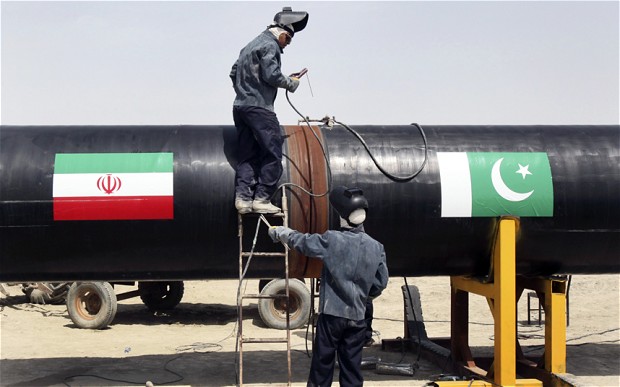Flying in the face of American warnings of possible economic sanctions, Pakistani President Asif Ali Zardari travelled to the Iranian town of Gabd on March 11 to meet with President Mahmoud Ahmadinejad and mark the inauguration of a pipeline project between the two nations.
Dubbed as the “peace pipeline”, the completed project is scheduled to begin daily transportation of approximately 21.5 million cubic metres of Iranian natural gas to energy-strapped Pakistan by December 2014. Iran, which has already completed its section of the 1150 kilometre pipeline, has offered to lend the Pakistani government $500 million towards the nearly $1.5 billion needed to fund the rest of the venture. It has also pledged to provide domestic contractors to undertake the remaining work. Pakistan plans on raising the remaining funds through a combination of loans from the Chinese government and an added fee to domestic electricity bills.
This ongoing process has been met with vocal disapproval from the United States government, which has repeatedly condemned Iran for its pursuit of nuclear weapons. The US State Department issued an official statement on March 11, warning Pakistan that its continued participation in the pipeline project may lead to its invocation of the Iran Sanctions Act, which allows for the extension of economic restrictions to any non-American firm that invests more than $20 million into Iranian oil resources. Apart from establishing barriers to trade, the imposition of sanctions would also bring an end to the United States’ provision of financial aid to Pakistan, which amounted to over $2.8 billion from 2009 to 2012.[captionpix align=”right” theme=”elegant” width=”320″ imgsrc=”http://natoassociation.ca/wp-content/uploads/2013/03/AHMADINEJAD-ZARDARI.jpg” captiontext=”Pakistani President Asif Ali Zardari (Right), seen here with Iranian President Mahmoud Ahmadinejad. The two countries are moving forward with the construction of a pipeline that will transport Iranian natural gas to Pakistan, which will help to alleviate the country’s ongoing energy crisis.”]
The incident marks just the latest chapter in a period of escalating tension between Pakistan and the West. The Pakistani government has repeatedly come under criticism for lax regulation of the country’s border region with Afghanistan, which has become a safe haven for various terrorist organizations. While on a visit to India in 2010, British Prime Minister David Cameron nearly sparked a diplomatic crisis when he accused Pakistan of “promoting the export of terrorism”. Cameron’s comments came a week after leaked war logs revealed that the ISI (Pakistan’s intelligence service) had been openly supporting the operations of numerous militant insurgency groups. The ISI’s activities came under scrutiny again in 2011, this time from American sources claiming its complicity in attacks on the US Embassy and NATO headquarters in Afghanistan. Pakistan, on the other hand, took offense to the 2011 American operation that led to the death of Osama bin Laden near Islamabad, citing the United States’ deployment of armed forces without prior notification as a breach of its sovereign authority. In the same year, it banned NATO from utilizing supply routes into Afghanistan after 26 of its soldiers were killed in a US-led air strike, restoring access a year later only after an official American statement of apology.
Despite this proliferation of bilateral disputes, Pakistan’s vital importance as a regional ally has so far dissuaded Western countries from resorting to open hostility. As it learned the hard way in 2011, the continued success of NATO’s Afghanistan mission hinges on its ability to access Pakistani supply routes. The presence of a friendly regime east of the border will also be crucial in 2014, when the US and other nations are slated to withdraw en masse from the conflict zone. Recent history suggests that the current American threat of sanctions amount to little more than dramatic posturing. While the US issued similar warnings in 2011 following preliminary negotiations on the “peace pipeline”, Pakistan continues to be officially recognized by the US as one of its Major Non-NATO Allies and receive billions of dollars annually in financial and military aid. In proceeding with complete disregard of American overtures, Zardari is testing the limits of the diplomatic impunity provided by Pakistan’s strategic indispensability. Given the severe consequences of potentially losing Pakistan as an ally, the West appears unable to call him on this bluff.[captionpix align=”left” theme=”elegant” width=”320″ imgsrc=”http://natoassociation.ca/wp-content/uploads/2013/03/7E901A83-DD96-43FC-98F1-B34AED677A27_w640_r1_s_cx0_cy0_cw01.png” captiontext=”A map of the proposed pipeline. Souce: VOA.”]
At the heart of the matter lies Pakistan’s pressing need to resolve its ongoing energy crisis, which is poised to become the central issue of contention in the lead-up to the country’s general elections in May. With domestic production accounting for only 30% of its overall needs, fuel shortages currently pose the greatest impediment to the growth of Pakistan’s heavily natural-gas dependent industries. Lack of energy has also resulted in daily power outages of up to 12-18 hours in certain regions of the country, contributing to growing public discontent. It comes as no surprise that the administration has turned to Iran, with the world’s second largest natural gas reserves, to resolve this chronic dilemma.
With coercion off the table, the West can only hope to dissuade the Pakistani government from pursuing economic cooperation with Iran by providing viable alternative solutions to its energy crisis. Some progress has been made on this front; the US has suggested the construction of a pipeline from Turkmenistan that would supply both Pakistan and Afghanistan, and has sought to wean Pakistan off its dependence on natural gas through the construction and renovation of hydroelectricity dams. It will be the success of these initiatives, rather than the threat of economic sanctions, that deters the further consolidation of an Iran-Pakistan partnership in the coming years.




